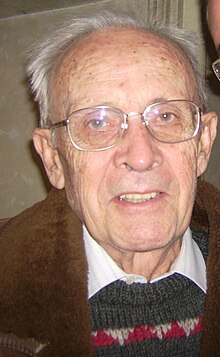|
Giovanni Berlinguer
Giovanni Berlinguer Cavaliere di Gran Croce OMRI (Italian pronunciation: [dʒoˈvanni berliŋˈɡwɛr]; 9 July 1924 – 6 April 2015) was an Italian politician, humanist, and professor of social medicine.[2] Life and careerGiovanni Berlinguer was born in Sassari, Sardinia, the son of Mario Berlinguer. A physician and professor of public health, he worked first in social medicine at the University of Sassari (1969–1974) and then in occupational health at the Sapienza University of Rome (1975–1999).[citation needed] Like his brother Enrico, he was a major figure in the Italian Communist Party (PCI) and was elected to the Chamber of Deputies in 1972, 1976, and 1979, and to the Senate of the Republic in 1983 and 1987. He ran for secretary of the Democrats of the Left (DS) in 2001 but was defeated by Piero Fassino 61.8% to 34.1%. From 2004 to 2009, Berlinguer was a member of the European Parliament representing the DS and sat with the Party of European Socialists group. At the convening of the European Parliament on 20 July 2004, he was found to be the oldest member, and as such presided over the parliament during the election of Josep Borrell Fontelles in 2004 and Hans-Gert Pöttering in 2007 as the president of the European Parliament. Berlinguer was in charge of the first National Health Plan in the context of the Economic Development Program adopted by the Italian Parliament in 1968. He was also a member of the National Health Council between 1994 and 1996, and vice-chairman (1992–1995) and chairman (1999–2001) of the National Bioethics Committee (CNB).[3] He was a member of the UNESCO International Bioethics Committee (2001–2007) and of the Commission on the Social Determinants of Health,[4] as well as of the World Health Organisation. He was rapporteur on the first project, held in 2003,[5] of the UNESCO "Universal Declaration on Bioethics".[6] In the years of his chairmanship, the CNB strategy underwent some noteworthy changes. Priority was no longer given to frontier bioethics but to its link with everyday bioethics, which Berlinguer articulated in his 2000 book Bioetica quotidiana (Everyday Bioethics).[7] This change implied that the CNB opinions were open to contributions not only of specialists but also of lay people, and new channels of communication were established with the public at large. The democratic guidance had comments and a significant impact at the local, national, and international level.[8] Berlinguer died in Rome at the age of 90.[9] Honors
See alsoReferences
External links
|
||||||||||||||||||||||||||||||||||||||
